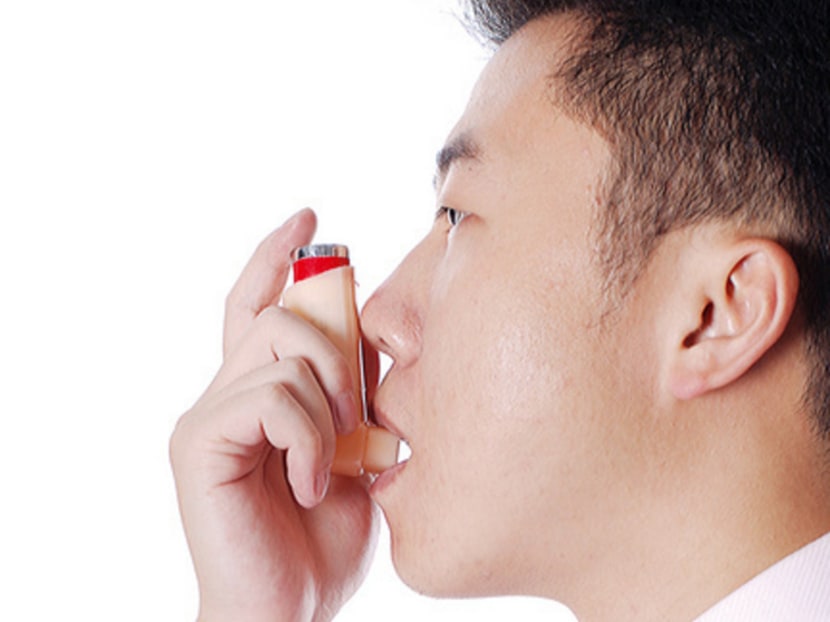Few adults have control over asthma
SINGAPORE — Since he was 12 years old, Mr Desmond Seng never knew what would trigger his asthma.

As there is no cure for asthma, the key to living with asthma is control, not just symptom relief, say experts. Photo: Thinkstock
SINGAPORE — Since he was 12 years old, Mr Desmond Seng never knew what would trigger his asthma.
Whenever he felt an attack on its way, the 57-year-old granite-and-dust supplier would reach for his inhaler, which would provide almost-immediate relief from his symptoms. Afterwards, life would go on as normal — that is, until his next asthma attack.
However, Mr Seng has gained control of his condition, since he started on preventive medication six years ago.
General practitioner (GP) Dr Tan Tze Lee from the Edinburgh Clinic said about one in 20 adults suffers from asthma in Singapore. The chronic lung disease causes the airways to become inflamed. This narrows the airways, causing breathing difficulties.
Most children with asthma outgrow the condition, but not all do. Some adults may also develop asthma in adulthood, and this form of asthma usually persists and can be severe, said Dr Mariko Koh, senior consultant at the Department of Respiratory and Critical Care Medicine at Singapore General Hospital (SGH).
SGH is one of the centres involved in the Singapore National Asthma Programme. Its Difficult-to-treat/Severe Asthma Clinic saw more than 600 patient attendances last year. About 15 to 20 cases of severe asthma are referred there each month by polyclinics, GPs and private specialists.
Poorly controlled asthma can lead to serious consequences, such as permanent lung damage and severe asthma attacks that can kill, said Dr Koh.
“During a severe asthma attack, the airways constrict, resulting in a lack of oxygen supply and then death,” she explained.
COMPLACENT ABOUT ASTHMA CONTROL
Mr Seng’s previously inefficient method of coping with asthma is not unusual among Singaporean adults grappling with the inflammatory airway disease.
Compared with other adult asthma patients in other countries, Singapore patients tend to worry less and are overconfident about managing their condition, according to a region-wide survey on asthma management in Asia by REALISE (Recognise Asthma and Link to Symptoms and Experience) Asia.
The survey looked at the perceptions and attitudes of more than 2,400 patients and 375 doctors in the Asian region. About 200 patients and 30 doctors from Singapore participated in the survey.
Nine in 10 Singapore respondents (94 per cent) think that their asthma is under control. In reality, however, only a quarter have well-controlled asthma, according to the clinical guidelines.
There is currently no cure for asthma, but the majority of patients can control their symptoms by adhering to their doctor’s orders. Common symptoms include coughing, wheezing, chest tightness and shortness of breath.
Dr Tan, a member of the REALISE Asia steering committee, said asthma is considered well controlled if the symptoms are minimal or even non-existent. He said: “A patient with well-controlled asthma would be able to go to work or school without fear of asthma affecting his daily routine.”
When it’s under control, the disease would also not affect the patient’s lifestyle much. This means the patient can take part in sports, travel and sleep through the night without being awakened by symptoms, said Dr Tan.
“Unfortunately, some patients do not consider their asthma to be serious and tend to treat it reactively rather than proactively. They seek episodic symptom relief rather than ongoing preventative care. This behaviour leads to poorly controlled asthma,” said Dr Tan.
PATIENT-DOCTOR COMMUNICATION GAPS
Communication gaps between patients and their doctors could be one reason why patients mistakenly believe that their asthma is under control when it is not.
“Most patients polled (in the REALISE Asia survey) reported visiting their doctors regularly, having good relationships with them and having full discussions about the right treatment. Yet, almost half felt that their questions were not fully answered and many held inaccurate perceptions about the definition of well-controlled asthma,” said Dr Tan.
The doctors surveyed estimated that 65 per cent of their patients adhered to their medication. In reality, only 14 per cent took their controller medication regularly.
Dr Koh added that a patient may be unable to control his asthma if his or her inhaler technique is incorrect or if certain asthma triggers, such as allergens, are not removed.
In Mr Seng’s case, his dusty work environment was one of the triggers for his asthma attacks.
BE IN CONTROL
Asthma can be controlled by two types of medication: A controller and a reliever.
Patients on controller medication, which contains inhaled corticosteroids, should take these every day on a long-term basis to control persistent asthma and prevent symptoms, said Dr Tan. Relievers, or rescue medication, offer immediate relief by opening up the airways and relieving asthma symptoms within minutes. “But as effective as they are, relievers don’t have an anti-inflammatory action and do not address the root of the problem in asthma,” said Dr Tan.
For optimal asthma control, Dr Tan emphasised that controllers and relievers must work in tandem.
“Controllers and relievers sometimes come in separate inhalers but are also available in combination inhalers, which make it more convenient for patients to adhere to their medication,” he said.
Dr Koh added that some patients may still have problems controlling their asthma even with medication. In such instances, they should be referred to an asthma specialist or clinic.
Today, Mr Seng takes his preventive mediction every morning to control symptoms and prevent attacks. He now runs 25km a week, lifts weights and plays squash and golf.
His advice for fellow asthma sufferers is to take control of their illness, and maintain open communication with their doctors.
“You can use your rescue inhaler whenever you have an attack, but that is like fighting fire. Why not take control of your disease before an attack happens?” said Mr Seng.





